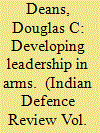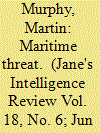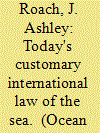| Srl | Item |
| 1 |
ID:
110167


|
|
|
| 2 |
ID:
071149


|
|
|
| 3 |
ID:
129852


|
|
|
|
|
| Publication |
2014.
|
| Summary/Abstract |
Failing to bolster the U.S. Navy in the face of 21st-century maritime threats could prove disastrous to the international order.
The year 2014 promises to be exceedingly important for the future of America's Navy. As the Pentagon and Congress face continued budget reductions and the Department of Defense is forced to weigh its priorities, the contours of American sea power and our global commitment to an expeditionary posture are at stake. Indeed, the choices made in just the next several years will lock in major trends in shipbuilding, naval aviation, and important research-and-development (R&D) efforts that will define the Navy of the 2020s and beyond.
American economic prosperity and national security have always been tied to the sea in some form. More than two centuries ago, George Washington wrote of the need, "as certain as that night succeeds the day," for effective sea power to achieve decisive military outcomes. Writing long before theorists like Alfred Thayer Mahan or Julian Corbett were heard from, Washington opined that success on land required superiority at sea. 1 Our nation's first foreign conflicts, the Barbary Wars at the dawn of the 19th century, were undertaken to secure global maritime trade against the scourge of international piracy. The growing U.S. ability to defend the maritime commons and project power abroad increased international respect for our fledgling nation and began America's ascent as a great power. Like Great Britain in an earlier era, the United States has used its maritime supremacy to construct an international order predicated on a commitment to unrestricted access to the global commons and deterrence of regional aggression
|
|
|
|
|
|
|
|
|
|
|
|
|
|
|
|
| 4 |
ID:
166910


|
|
|
|
|
| Publication |
New Delhi, Matrix Publishers, 2011.
|
| Description |
x, 164p.hbk
|
| Standard Number |
9788191014273
|
|
|
|
|
|
|
|
|
|
|
|
Copies: C:1/I:0,R:0,Q:0
Circulation
| Accession# | Call# | Current Location | Status | Policy | Location |
| 059694 | 327.54073/BHA 059694 | Main | On Shelf | General | |
|
|
|
|
| 5 |
ID:
114373


|
|
|
| 6 |
ID:
133952


|
|
|
|
|
| Publication |
2014.
|
| Summary/Abstract |
International courts and tribunals, governments, and scholars over the past half-century (many in the past two decades) have identified various provisions of the 1958 and 1982 treaties on the law of the sea that are customary international law and thus binding on all states, including those not party to these treaties. This article systematically collects these opinions and identifies provisions that have not yet attracted their attention
|
|
|
|
|
|
|
|
|
|
|
|
|
|
|
|
| 7 |
ID:
130774


|
|
|
|
|
| Publication |
2014.
|
| Summary/Abstract |
The year 2013 brought increased challenges to the Coast Guard as the service sought to balance a declining budget with increasing operational demand. Sequestration and other budget control actions forced a $295 million cut to the service's modest $8 billion budget. In his December testimony before the House Committee on Transportation and Infrastructure, Subcommittee on Coast Guard and Maritime Transportation, Vice Admiral John Currier, the service's Vice Commandant, talked of the operational impacts of sequestration that forced the Coast Guard to reduce operations, defer depot-level maintenance, and decrease spare parts levels and training. Additionally, sequestration required a 25 percent operational reduction that affected the Coast Guard's ability to maintain an effective maritime presence to detect, deter, and intercept at-sea threats.
|
|
|
|
|
|
|
|
|
|
|
|
|
|
|
|